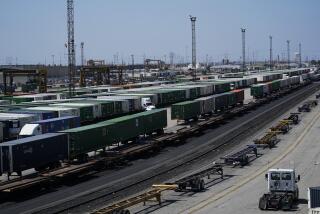Proposal Would Force Firms to Urge Car Pools
- Share via
A controversial proposal that would require large firms to promote ride-sharing by their employees in an attempt to clean up the smog-choked Los Angeles basin went before air pollution officials Friday.
The measure, known as Regulation VI, would require firms having more than 700 employees working on one shift at one site to offer incentives for workers to car-pool or ride buses to work.
The South Coast Air Quality Management District on Friday considered the plan, which if passed could mean fines of $1,000 a day for firms that fail to comply. District officials did not act on the measure but set a public hearing on it for Oct. 4.
Standards Exceeded
Supporters believe the plan is necessary to combat pollution. They point out that Southern California exceeds federal and state standards for every major pollutant except lead. Officials do not expect to reach attainment of those standards until the year 2000 at the earliest.
The plan has come under strong attack by the business community and some elected officials. Critics contend that the proposal unfairly attempts to regulate the behavior of employees and is inappropriate.
The district’s 14-member board appears split on the plan as well. Board Vice Chairman Thomas Heinsheimer, a Rolling Hills city councilman, compares it to totalitarianism that would “play well in Moscow and probably Peking.”
Voluntary Efforts Praised
“We are having great success right now with voluntary car-pooling efforts,” he said. “If you have a regulatory framework making it mandatory, you’ll get less cooperation, not more.”
Backers on the board say the proposal is intended only to make ride-sharing more attractive and easily available to employees now driving their own cars to work.
Under the proposal, ride-sharing plans would be submitted for approval to the district. They would include granting preferred parking places to car poolers, subsidizing bus fares and staggering work hours to reduce rush-hour traffic.
Businesses would pay for developing the plans for the incentives included in them.
More to Read
Sign up for Essential California
The most important California stories and recommendations in your inbox every morning.
You may occasionally receive promotional content from the Los Angeles Times.













